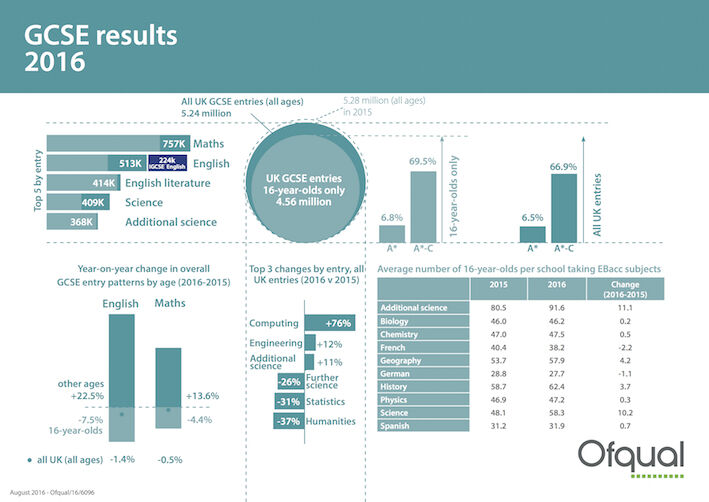GCSE results show ‘significant’ dip in pass rate
More than five million GCSE students in England, Wales and Northern Ireland will collect their results today amid reports that there has been a ‘significant’ fall in the overall pass rate and the number of A* grades.

Good news for GCSE STEM subjects
There is good news to report in STEM (Science, Technology, Engineering and Mathematics) subjects from this year's GCSE results. Entries to science and maths subjects by students aged 16 have increased by 6.3 per cent compared to 2015. In a statement today, Nick Gibb, School Standards Minister said that the government is, "committed to making Britain the best place in the world to study STEM subjects - helping to boost the UK economy in the long term."This year has also seen a significant increase in the number of entries by students studying GCSE computer science, from 35,414 in 2015 to 62,454 in 2016. The number of girls studying computer science has more than doubled since last year.
GCSE: overall pass rate dips in 2016
Overall pas rates have dipped and the number of A*-C grades awarded has fallen. A*- C passes have shown a decline of 2.1 percentage points to 66.9 per cent, although the number of entries are up, despite a fall in the 16 year old population.In the sciences there has been an increase in entries but a drop in results. At grade A*-C, Biology is down 0.4 percentage points, Chemistry down 0.9 percentage points and Physics down 1.1 percentage points.GCSE Maths: Entries on the up
Entries for GCSE Maths have increased by almost 33 per cent compared with 2015. The JCQ ascribes this to the new government policy in England requiring all 16-19 year old students to study the subject until they achieve at least a grade C.The government also has decreed that retakes of the GCSEs will not count in school performance tables, which has led to a massive reduction in the number of early entries for the exam. The ‘first entry counts’ policy has driven down entries by 15 year olds, from 33,484 in 2015 to 13,209 in 2016.The number of 16 year olds achieving grades A*-C in Maths has increased marginally (1.4 per cent). The JCQ explains that this may be attributed to fewer, less able, 15 year olds who are now typically waiting until they are 16 to take their Mathematics GCSE rather than taking them early with the option of re-sitting later.GCSE English
There has been slight decrease in the number of entries for GCSE English but, overall, outcomes for English have risen at A* by 0.2 percentage points to 3.3 per cent, declined at A*-A by 0.9 percentage points to 13.7 per cent and down 5.2 percentage points at A*-C to 60.2 per cent.The JCQ believes that the number of 17 years old passes at Maths and English is likely to increase over the coming years due to the policy requirement for students in England to continue studying English and Maths post 16 if they haven’t achieved at least a grade C.GCSE Modern Foreign Languages: Spanish sees the biggest rises
French and German continue to be the most popular foreign languages at GCSE level, but Spanish has shown a surge of interest amongst GCSE students with a rise of almost 28 per cent over the last five years.GCSE reform
2016 marks the last year before the start of major government GCSE reform and the way in which student performance is reflected in the school performance tables.From next year a new system will be phased in which will see GCSEs graded by numbers – from 9 (the highest) to 1 (the lowest) rather than the current system of A* - E.“I would like to offer huge congratulations to all students picking up their results today,” said Michael Turner, JCQ Director General. “It is also important to congratulate and thank their teachers, tens of thousands of whom each year use their expertise to mark the millions of examination papers.”Relocate Global’s new annual Guide to International Education & Schools provides a wealth of advice to anyone searching for a new school in the UK and in an international setting, and offers insights into what it takes to make the right school choice.
©2026 Re:locate magazine, published by Profile Locations, Spray Hill, Hastings Road, Lamberhurst, Kent TN3 8JB. All rights reserved. This publication (or any part thereof) may not be reproduced in any form without the prior written permission of Profile Locations. Profile Locations accepts no liability for the accuracy of the contents or any opinions expressed herein.






























